Anarchy in Night City: Cyberpunk 2077’s composers explain the game’s ‘punch and attitude’
Wake up, Samurai
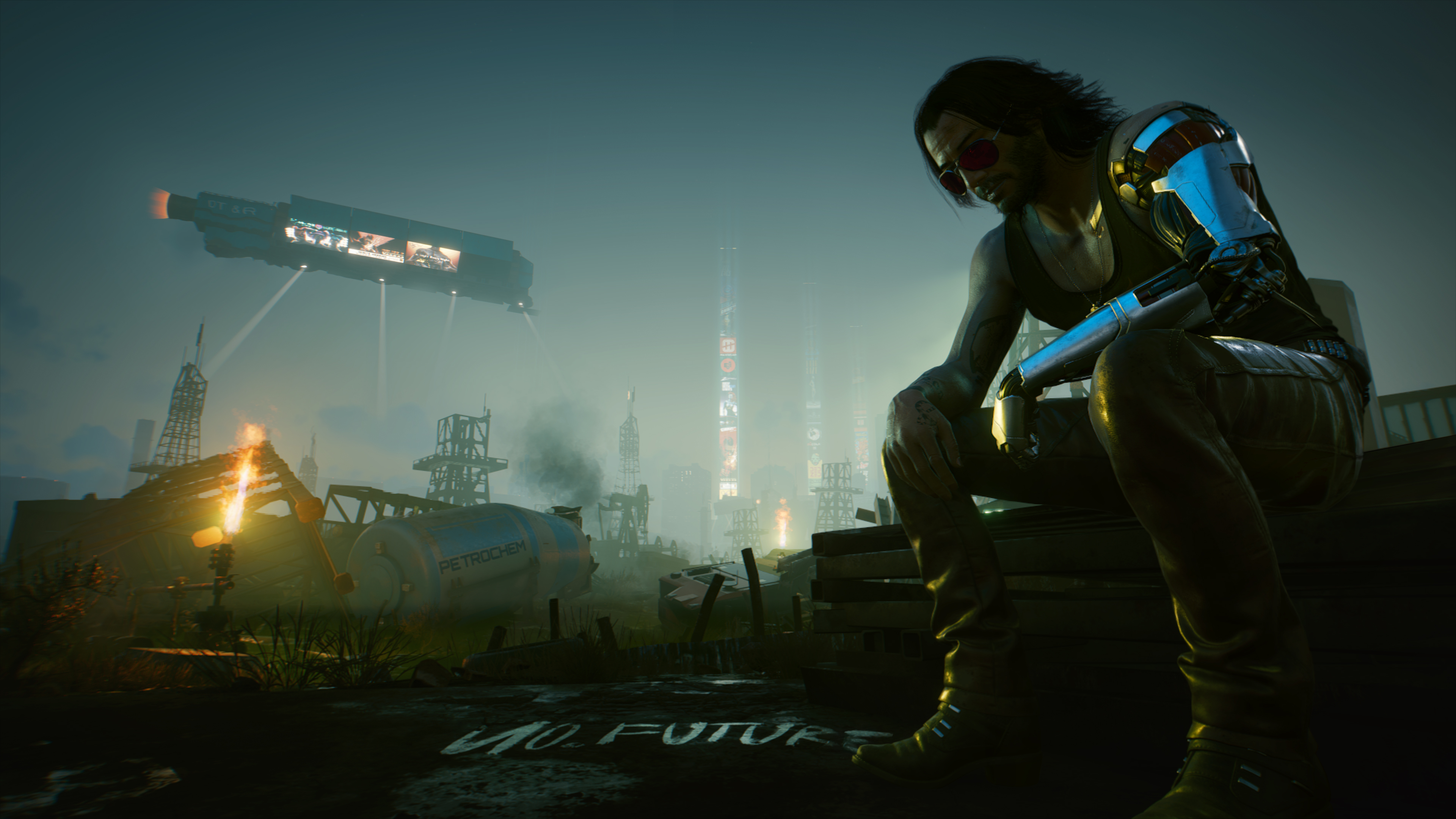
Sign up for breaking news, reviews, opinion, top tech deals, and more.
You are now subscribed
Your newsletter sign-up was successful
“We look at the present through a rearview mirror. We march backward into the future,” said Marshall McLuhan of the human journey on life’s accelerating, constantly evolving superhighways. The celebrated academic would surely have enjoyed exploring the cyberpunk universe, which emerged in the latter stages of his life and encapsulates many of McLuhan’s prophetic observations about culture, technology and existence itself.
Perhaps he might have foreseen making this questing trip in a flying police spinner, Kawasaki Blitzkrieg motorbike or Rayfield Aerondight S9 hypercar, vehicles that have traversed various cyberpunk worlds since it was first conceptualized in the early 80s. Rather like a Nostradamus of media theory, McLuhan recognized how transformative tools, objects, things more than information itself would be, anticipating the internet decades in advance and predicting that what laid ahead was often as much about our past as future.
A retro-futurist vision sits at the center of these enduringly elusive worlds, as imagined by Ridley Scott’s cinematic marvel Blade Runner in 1982, Mike Pondsmith’s hugely influential 1988 tabletop game, Cyberpunk, and CD Projekt Red’s (CDPR) spectacularly long-awaited Cyberpunk 2077 video game. The most recent incarnation has been years in the making and, while blending a vivid array of influences into the neon blitz of Night City’s landscape, 2020’s most blockbusting blockbuster is once again charged with showing us that what’s coming might not be that unknowable at all.
This is the inherent contradiction of cyberpunk and the music, score and soundtrack sit pulsing urgently at its core. What makes this factor so key to building future worlds like the one in Cyberpunk 2077? In a recent gameplay trailer, CDPR’s Marcin Przybyłowicz, one of three composers deployed to devise the music for this warped and inevitably dystopian RPG, identified it as “the main vessel of emotions in both movies and video games”.
Composers turn to a new decade for inspiration
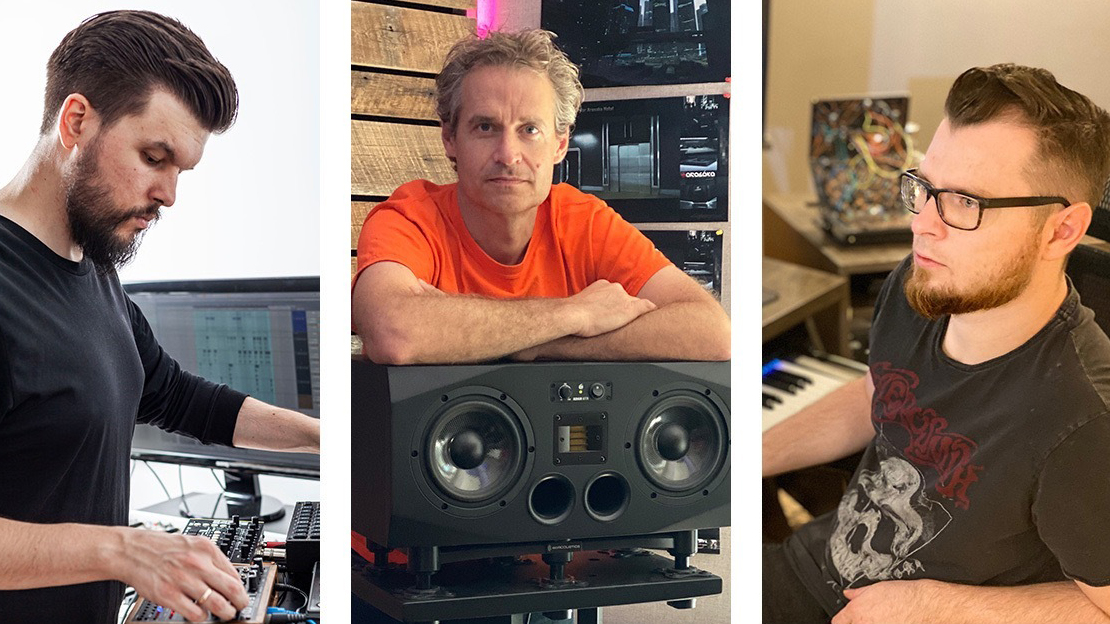
In an interview with TechRadar, alongside Paul Leonard-Morgan and P.T. Adamczyk, Przybyłowicz explains how the sound of the game developed from the point he came on board a full five years ago. He quickly realized that the project required a further recalibration of the myths that inform our understanding of cyberpunk, most notably the decade in which it was first popularized by the likes of Scott and Pondsmith, following in the chemtrails of literary figures such as Philip K. Dick and William Gibson.
"The issue with the ‘80s was that there is a very specific image of cyberpunk music that audiences have. We have Blade Runner, we have Ghost In The Shell, we have the Deus Ex franchise in video games. There was Akira and Dredd but the cyberpunk genre is not that densely populated as a fantasy."
Marcin Przybyłowicz
“The issue with the ‘80s was that there is a very specific image of cyberpunk music that audiences have,” Przybyłowicz tells us. “We have Blade Runner, we have Ghost In The Shell, we have the Deus Ex franchise in video games. There was Akira and Dredd but the cyberpunk genre is not that densely populated as a fantasy. There aren’t that many examples to research or analyze. But the things we did find within that idiom and what they contributed sonically didn’t do it for us.
“Because there are tender moments, there are contemplative moments, there are human to human moments in Cyberpunk 2077 but in general this is not a slow burner game where you drive hundreds of miles at night while it’s raining and you contemplate where human ends and machines begin, for example. There is also a place for action, for gang heists, for corporate wars, all the stuff that Mike Pondsmith wrote in the Cyberpunk 2020 sourcebooks,” explains Przybyłowicz.
Sign up for breaking news, reviews, opinion, top tech deals, and more.
He envisioned finding “this punch and attitude in the ‘90s”, a decade infected by the incendiary venom of Rage Against The Machine, Beastie Boys, The Prodigy and Nine Inch Nails. CDPR’s creative director Adam Badowski agreed and the result is an intense, unforgiving melee of electronic genres, redolent of the noisier end of HEALTH’s Max Payne 3 soundtrack and Mac Quayle’s contributions to The Last of Us 2 score. Perhaps, even, the sonic equivalent of George Orwell’s 1984: “If you want a picture of the future, imagine a boot stamping on a human face – forever.”
Challenge following score of The Witcher 3
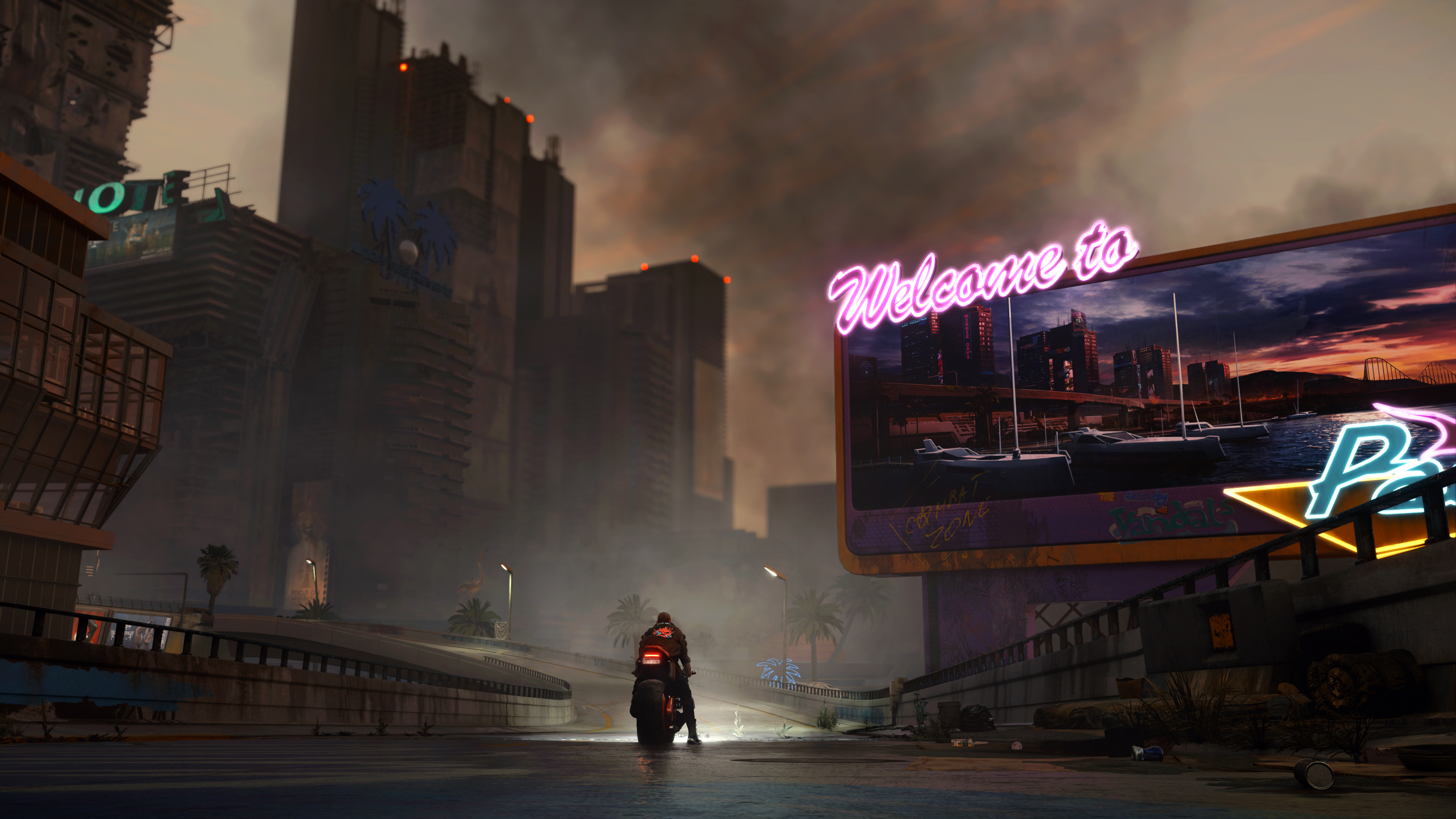
Vangelis it is not. It’s also absolutely nothing like The Witcher 3, the hugely acclaimed CDPR title which preceded Cyberpunk 2077 and was evocatively scored by Przybyłowicz. How different was this project?
"For me the biggest challenge was to find a way to come up with cinematic applications of non-cinematic genres, such as techno, industrial, EDM, and use them as a narrative tool in our game."
Marcin Przybyłowicz
“For me the biggest challenge was to find a way to come up with cinematic applications of non-cinematic genres, such as techno, industrial, EDM, and use them as a narrative tool in our game,” Przybyłowicz says. “My problem was that, like the others, I am a trained musician and for the bigger part of my education was taught that the music needs to feature a melody and there is a lack of that in these genres.
“It’s easy to work with melodic material when scoring a game or TV series but it becomes much more complicated when you remove melody as one of the elements in the picture and are left with the pulse, a rhythmic layer, structure and fabric of sound, the texture. You have to deal with those and still come up with cinematic applications to make your music do things it is supposed to do. Finding that balance was a real challenge,” says Przybyłowicz.
Leonard-Morgan agrees: “There are some beautiful melodies in the game. It’s not an endless wall of electronica but we’ve used them more as motifs than melodies. They appear during the emotional parts, those moments of humanity, that you’re always going to find no matter how dark and bleak you find life. But it’s not like a John Williams soundtrack where you can rely on a full-on 30 second theme, which Marcin did with The Witcher 3. With this, it’s much more about smaller motifs coming in and telling you something is about to happen.”
The score, recorded predominantly on analogue hardware, runs to eight hours but has an abiding “sonic unity”, suggests Leonard-Morgan. It’s supported by 12 in-game radio stations of exclusive, officially licensed material, featuring the likes of Run The Jewels, Grimes, ASAP Rocky and Gazelle Twin.
Keanu Reeves becomes Johnny Silverhand
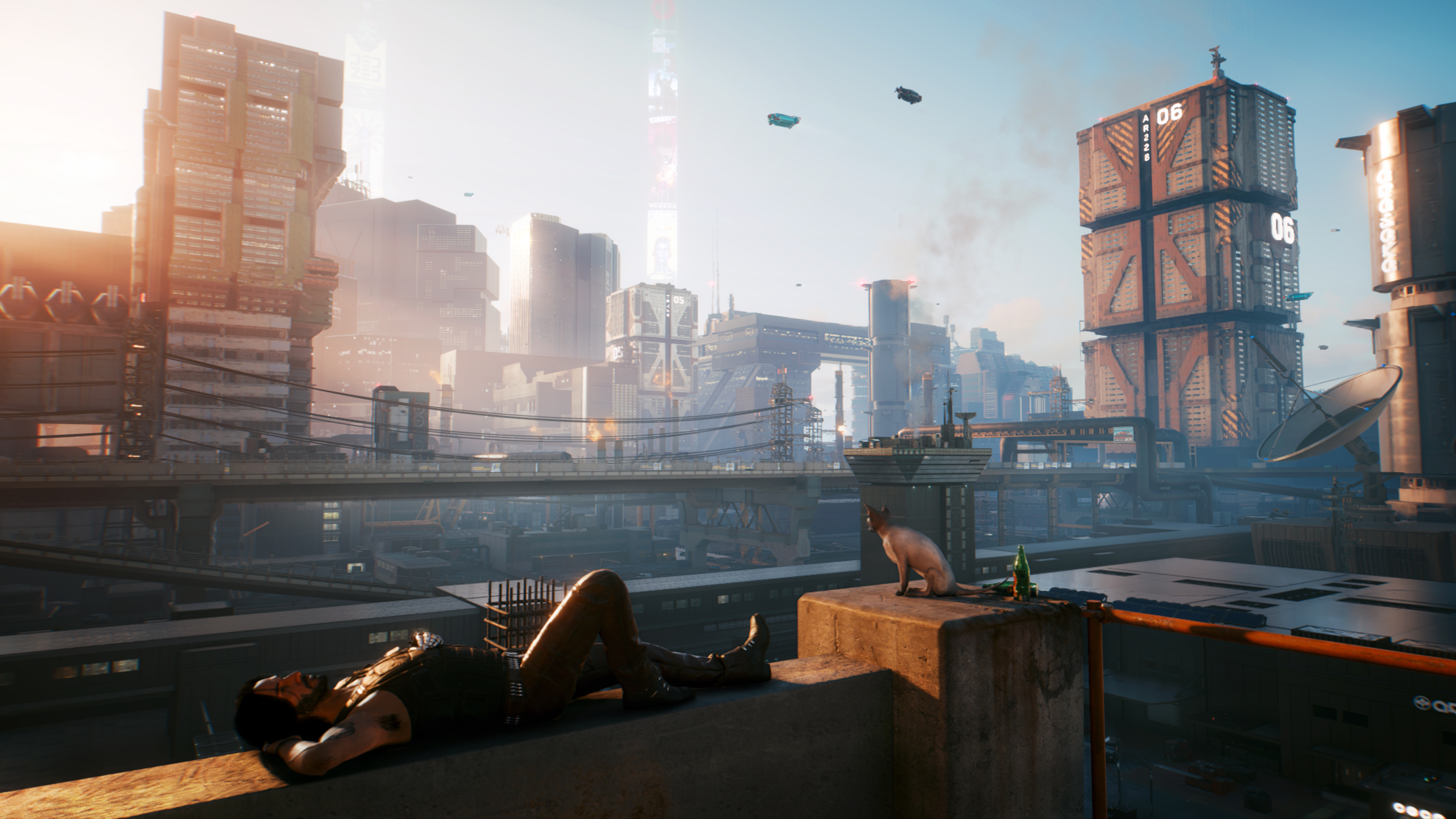
Exploring these themes, Adamczyk explains how CDPR’s musical choices are intended to be both reflective of their individual framing of this cultural genre and reinforce the narrative scope.
"Cyberpunk music from the ‘80s and that retro-futurist take is still very optimistic in a way and this game is not that optimistic. Although very dark at times, things like Blade Runner still have a sense of fairytale. "
P.T. Adamczyk
"Cyberpunk music from the ‘80s and that retro-futurist take is still very optimistic in a way and this game is not that optimistic. Although very dark at times, things like Blade Runner still have a sense of fairytale. I guess one way of looking at the difference, the ‘80s is the Mötley Crüe decade and the 90s is the Nirvana decade. They’re still playing rock music but it’s a different take,” he says.
This context has a deeper connection to a specific character: Johnny Silverhand. In a title ripped with USPs, the presence of Keanu Reeves is certainly among Cyberpunk 2077’s biggest draws. As Silverhand, he fronts the fictional rock band SAMURAI, played within the storyline by Scandinavian hardcore punk act Refused. Described by Pitchfork as “the type of live band that would slice the top of your skull off”, they released the "brain-obliterating" album The Shape Of Punk To Come in 1998.
How did they get involved? “There were a lot of parallels. The Refused split up, like SAMURAI. They made similar music, certainly in our version of cyberpunk. In the original, Johnny is more like Joe Satriani or Steve Vai, he’s more like a prog rocker who can shred. Our version is basically a rhythm guitar player. Also, the rebellious attitude that the Refused had, especially on The Shape Of Punk To Come, they were really vocal politically, their songs had a lot of that sort of 90s attitude and they were a 90s band.
“The only thing that didn’t click was that they were Swedish and we had to be careful about putting the right stamp on it and getting the accent right for Johnny and particularly for Johnny played by Keanu Reeves,” comments Adamczyk. A central figure in the main campaign, Silverhand is a foul-mouthed phantom in trailers, part man, part machine, seemingly half alive, half dead. His presence, intangible though it remains, is one of the few constants in the development of Cyberpunk 2077, which was first announced in May, 2012.
Mike Pondsmith’s key Cyberpunk influence
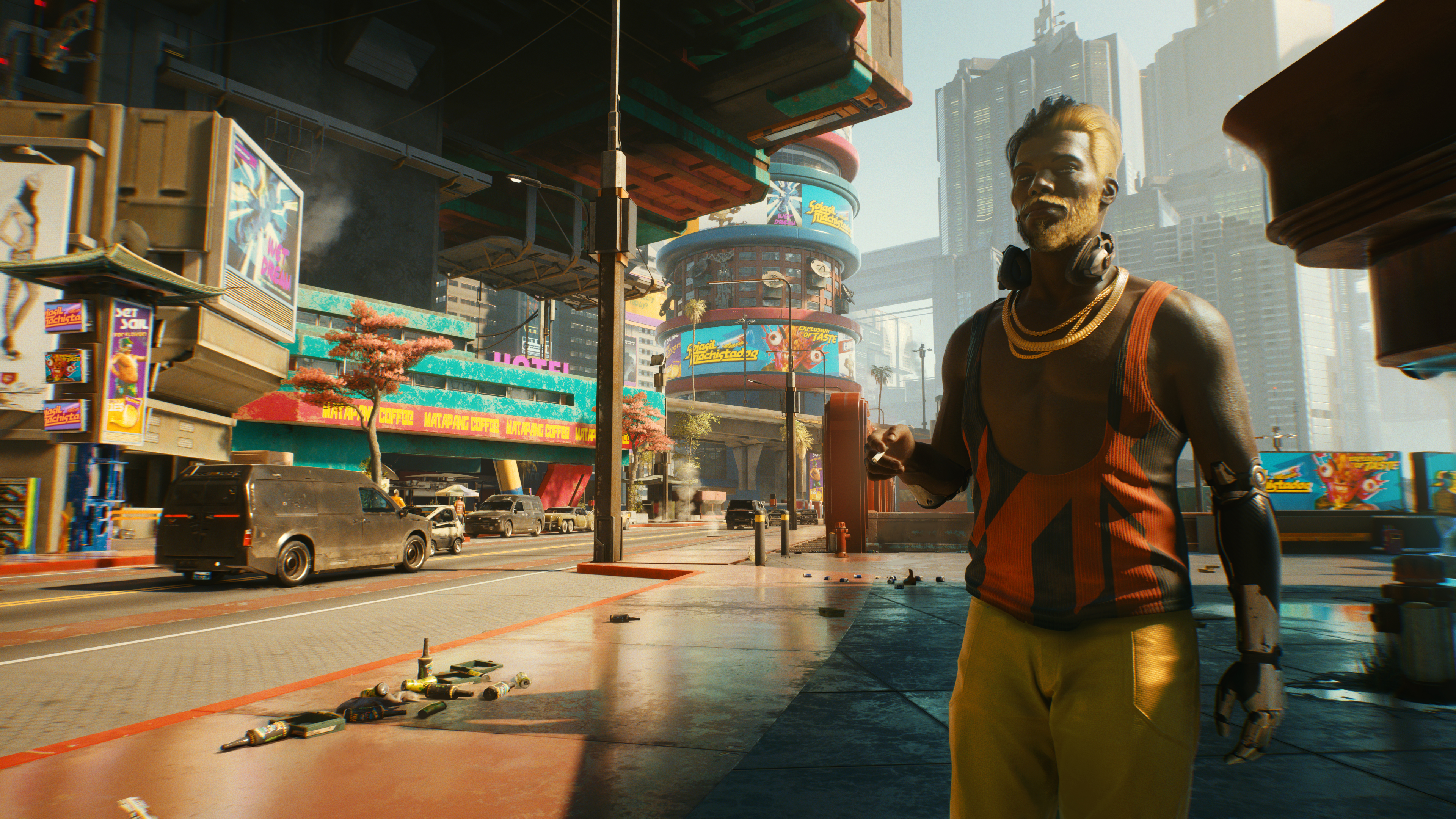
“There was no brief at all,” confirms Przybyłowicz of CDPR’s original plan. In an environment perhaps definitively described as “lowlife and high tech” by Bruce Sterling in the preface to Gibson’s Burning Chrome, one other thread remains noteworthy: the influence of Pondsmith’s Cyberpunk franchise, which mapped out many of the characters, locations and themes to be found in the fictitious Night City, a sprawling, mechanized metropolis of techno-shocked anarchy, situated in the Free State of Northern California.
“It’s still a source for everything we have done but it remains a source. There is a reason why the most recent pen and paper edition is called Cyberpunk 2020 and our game is called Cyberpunk 2077. This gap of 57 years has its purpose story-wise and because of that gap we also had to iterate on some concepts or musical ideas so that it would click together,” concludes Przybyłowicz. But how does it click together, exactly? The world is, finally, about to find out what the future looks and sounds like.
Cyberpunk 2077 releases December 10 for PC, Xbox One, PlayStation 4 and Stadia as well as being playable on Xbox Series X|S and PlayStation 5 consoles.
- Check out our Cyberpunk 2077 review